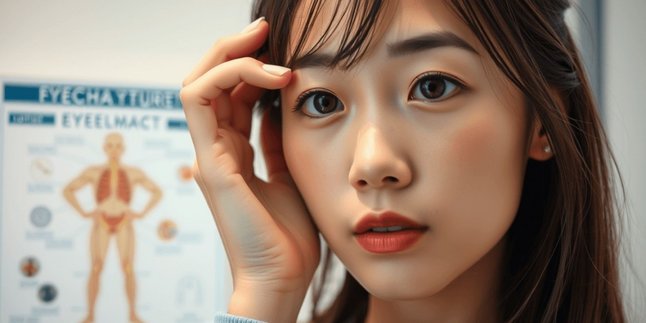
Meaning of Right Upper Eyelid Twitching According to Javanese Primbon
1. Definition of Eyelid Twitching
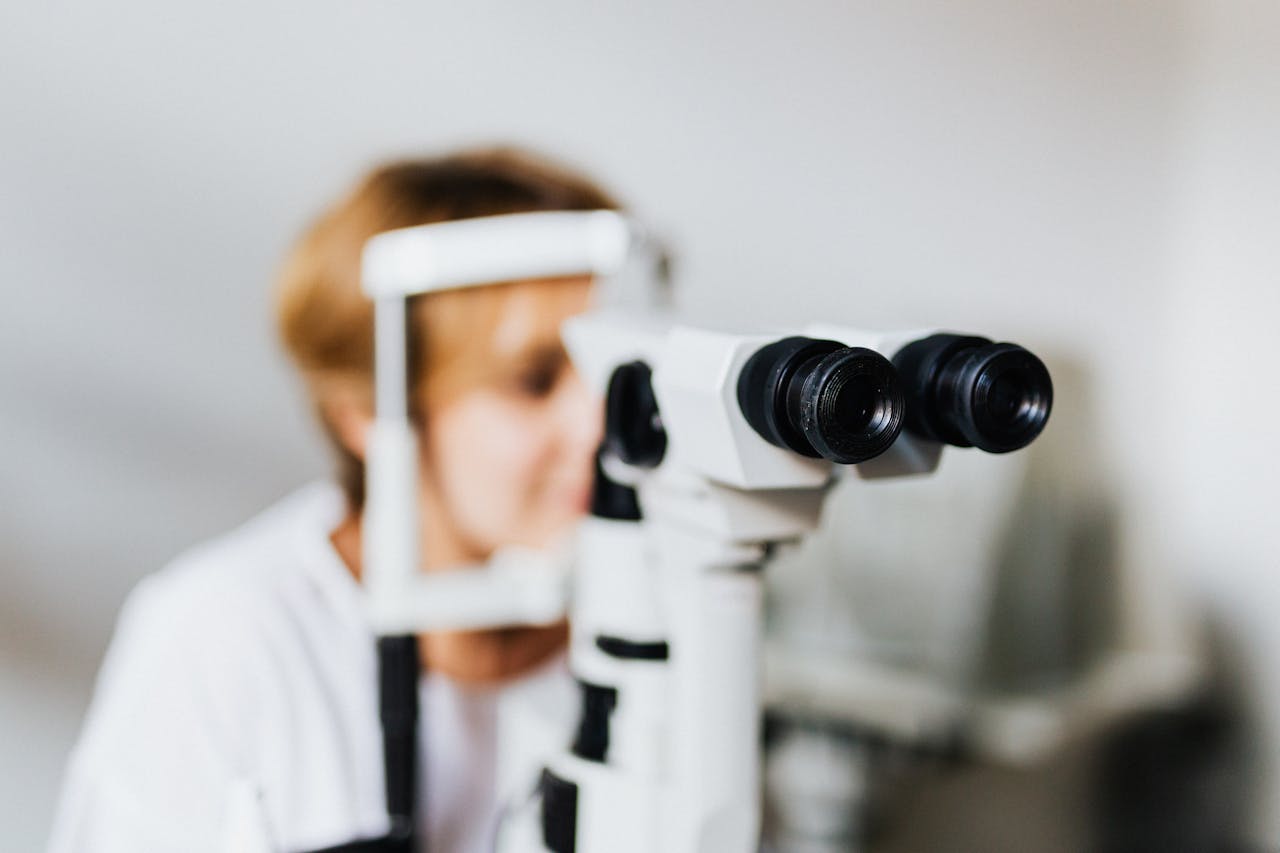
Eye doctor (credit: pexels.com)
Eyelid twitching is an involuntary muscle contraction in the eyelid or the area around the eye. This condition is generally temporary and not harmful. In medical terms, eyelid twitching is also referred to as blepharospasm or myokymia.
Eyelid twitching can occur in one or both eyes, either in the upper or lower eyelids. The intensity and duration of the twitching vary, ranging from mild and brief to stronger and longer-lasting. Although it can be bothersome, eyelid twitching usually resolves on its own within a few minutes or hours.
This phenomenon of eyelid twitching is very commonly experienced by many people. Several factors that can trigger eyelid twitching include fatigue, stress, excessive caffeine consumption, lack of sleep, or irritation to the eyes. In most cases, eyelid twitching is not an indication of a serious health problem.
However, in certain cultures, particularly in Javanese primbon, eyelid twitching is often associated with various meanings and predictions. Although it lacks scientific basis, this belief is still held by some members of society as part of local wisdom.
2. Causes of Upper Right Eye Twitching
Twitching in the upper right eye can be caused by various factors. Here are some common causes of eye twitching:
- Fatigue and lack of sleep - Eyes that are too tired due to lack of rest can trigger twitching.
- Stress and anxiety - Mental pressure can cause muscle tension around the eyes.
- Excessive caffeine consumption - Large amounts of caffeine can stimulate the nervous system and cause twitching.
- Nutritional deficiencies - Deficiencies in magnesium or vitamin B12 can affect nerve and muscle function.
- Dry eyes - A lack of tears can cause irritation and twitching in the eyes.
- Excessive digital screen use - Staring at a computer or smartphone screen for too long can lead to eye fatigue.
- Allergies - Allergic reactions can cause itching and irritation around the eyes.
- Medication side effects - Some types of medication can trigger twitching as a side effect.
- Neurological disorders - In rare cases, twitching can be a symptom of a nerve disorder.
It is important to remember that eye twitching is generally temporary and not harmful. However, if the twitching persists or is accompanied by other disturbing symptoms, it is advisable to consult a doctor for further examination.
3. Meaning of Upper Right Eye Twitching According to Javanese Primbon
In Javanese tradition, twitching in various parts of the body is believed to have certain meanings. Specifically for the twitching of the upper right eye, several interpretations in Javanese primbon mention:
- Sign of good fortune - Twitching in the upper right eye is often considered a sign of upcoming good fortune or blessings. This could manifest as success in work, profitable business opportunities, or unexpected windfalls.
- Will receive good news - Some versions of primbon interpret this twitching as a sign of good news coming. This good news may be something that has been long awaited or even an unexpected surprise.
- Meeting with an important person - There are also interpretations that state that twitching in the upper right eye indicates a forthcoming meeting with someone important or influential. This meeting may bring positive impacts on life or career in the future.
- Sign of healing - For those experiencing illness or health issues, twitching in the upper right eye is sometimes considered a sign of upcoming healing or improvement in health condition.
- Warning to be cautious - Although most interpretations are positive, there are also those who interpret the twitching of the upper right eye as a warning to be more cautious. This could mean that there are challenges or obstacles to be faced, thus requiring greater vigilance and preparation.
It is important to remember that these interpretations are part of traditional beliefs and do not have a scientific basis. Everyone is free to believe or not believe in these interpretations. In the context of modern health, it is wiser to understand eye twitching from a medical perspective and seek appropriate treatment if necessary.
4. Medical Explanation About Eye Twitching
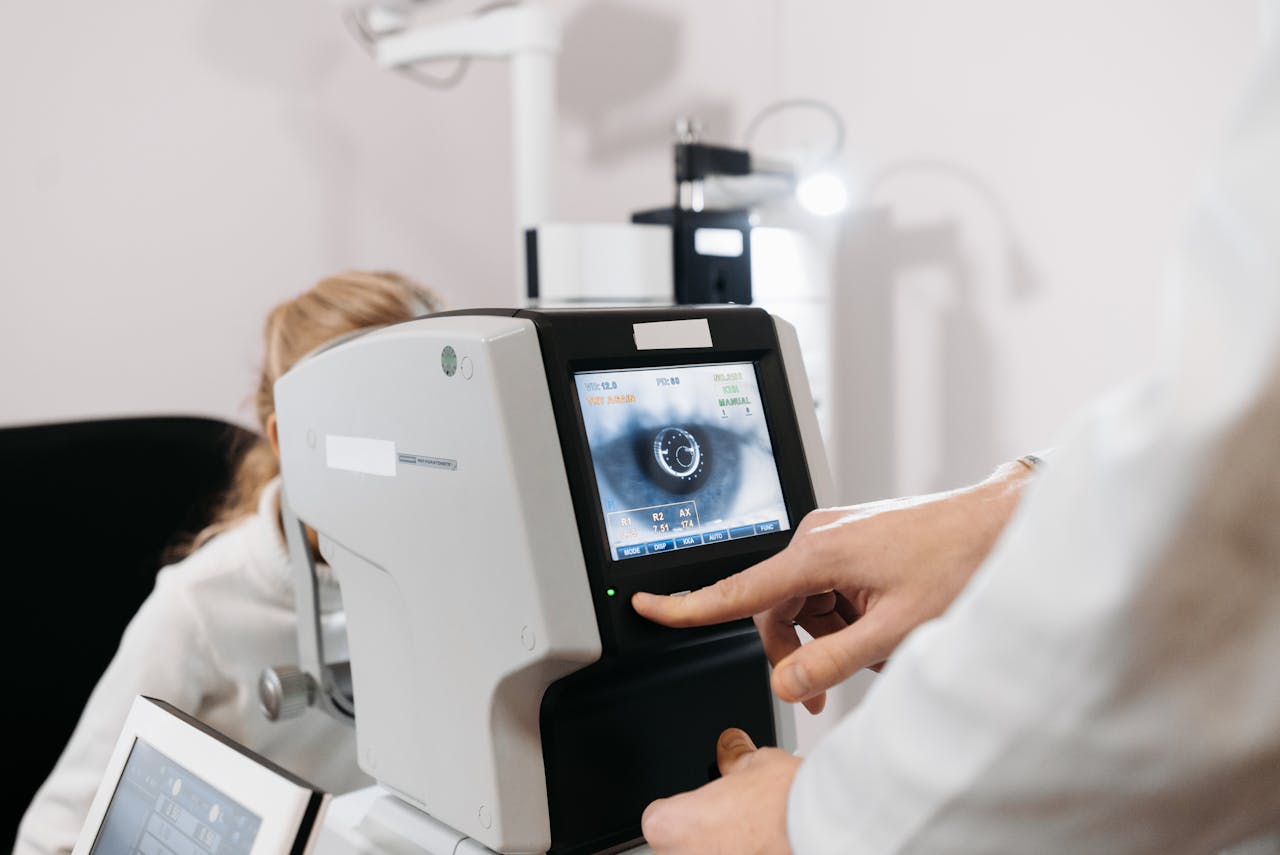
Eye doctor (credit: pexels.com)
From a medical standpoint, eye twitching, including in the upper right eye, is a phenomenon that can be scientifically explained. Here are some medical explanations regarding eye twitching:
- Involuntary muscle contraction - Eye twitching occurs due to involuntary contractions of the muscles in the eyelid or surrounding area. These contractions are usually caused by excessive stimulation of the nerves that control those muscles.
- Neurotransmitter disturbances - Twitching can occur due to an imbalance in neurotransmitters, the chemicals that play a role in transmitting signals between nerve cells. Fatigue, stress, or sleep disturbances can affect this neurotransmitter balance.
- Eye surface irritation - Conditions such as dry eyes or allergies can cause irritation on the eye's surface, which then triggers twitching as a reflex response.
- Eye muscle fatigue - Excessive use of the eyes, such as staring at a computer screen for long periods, can lead to fatigue in the eye muscles and trigger twitching.
- Stimulant effects - Consumption of caffeine, nicotine, or other stimulants in excessive amounts can stimulate the nervous system and cause eye twitching.
- Nutrition deficiencies - Deficiencies in several essential nutrients, such as magnesium or B vitamins, can affect nerve and muscle function, potentially leading to twitching.
- Neurological disorders - In rare cases, persistent eye twitching could be a symptom of neurological disorders such as blepharospasm or hemifacial spasm.
It is important to note that in the majority of cases, eye twitching is a harmless condition and will resolve on its own. However, if twitching persists for a long time, occurs frequently, or is accompanied by other troubling symptoms, it is advisable to consult an eye doctor or neurologist for further examination.
5. Symptoms Accompanying Eye Twitching
Eye twitching, including in the upper right eye, often occurs without other accompanying symptoms. However, in some cases, eye twitching may be accompanied by various additional symptoms. Here are some symptoms that may accompany eye twitching:
- Uncontrolled blinking sensation - In addition to twitching, a person may feel an urge to blink more frequently than usual.
- Eyes feel tired or strained - Fatigue in the eyes often accompanies twitching, especially if caused by excessive eye use.
- Eyes feel dry or itchy - Irritation on the surface of the eyes can cause a dry or itchy sensation accompanying the twitching.
- Sensitivity to light - Some people may experience increased sensitivity to bright light when experiencing eye twitching.
- Temporary blurred vision - Although rare, intense twitching can cause temporary visual disturbances.
- Mild headache - Tension in the eye and facial muscles can sometimes lead to a mild headache.
- Watery eyes - In response to irritation, the eyes may produce more tears.
- Difficulty fully opening the eyes - In more severe cases, twitching can cause difficulty in fully opening the eyes.
It is important to remember that these symptoms are generally mild and temporary. However, if these symptoms become intense, persistent, or interfere with daily activities, it is advisable to consult a healthcare professional. An eye doctor or neurologist can conduct further examinations to determine the cause and provide appropriate treatment.
6. Diagnosis of Eye Twitching
The diagnosis of eye twitching, including in the upper right eye, can generally be made through a physical examination and the patient's medical history. However, in some cases, the doctor may perform additional tests to ensure there are no more serious conditions. Here are the steps that may be taken in the process of diagnosing eye twitching:
- Anamnesis (medical history) - The doctor will ask about the symptoms experienced, when the twitching started, how often it occurs, and any factors that may trigger the twitching.
- Physical examination - The doctor will examine the patient's eyes and face to observe the characteristics of the twitching and look for signs of other related conditions.
- Vision test - Tests for visual acuity and other eye functions may be conducted to ensure there are no issues with vision.
- Neurological examination - If a neurological problem is suspected, the doctor may conduct a nerve function examination.
- Blood tests - In some cases, blood tests may be recommended to check levels of electrolytes, magnesium, or vitamins that may play a role in twitching.
- Electromyography (EMG) - This test can be used to measure electrical activity in the muscles affected by twitching.
- Brain imaging - In rare cases where serious neurological issues are suspected, the doctor may recommend an MRI or CT scan of the brain.
It is important to remember that in most cases, eye twitching is a harmless condition and does not require extensive examination. However, if the twitching is persistent, disrupts vision, or is accompanied by other concerning symptoms, the doctor may conduct further examinations to ensure there are no more serious conditions.
An accurate diagnosis will help the doctor determine the most appropriate management, ranging from simple lifestyle changes to medical interventions if necessary.
7. Treatment and Care for Eye Twitching
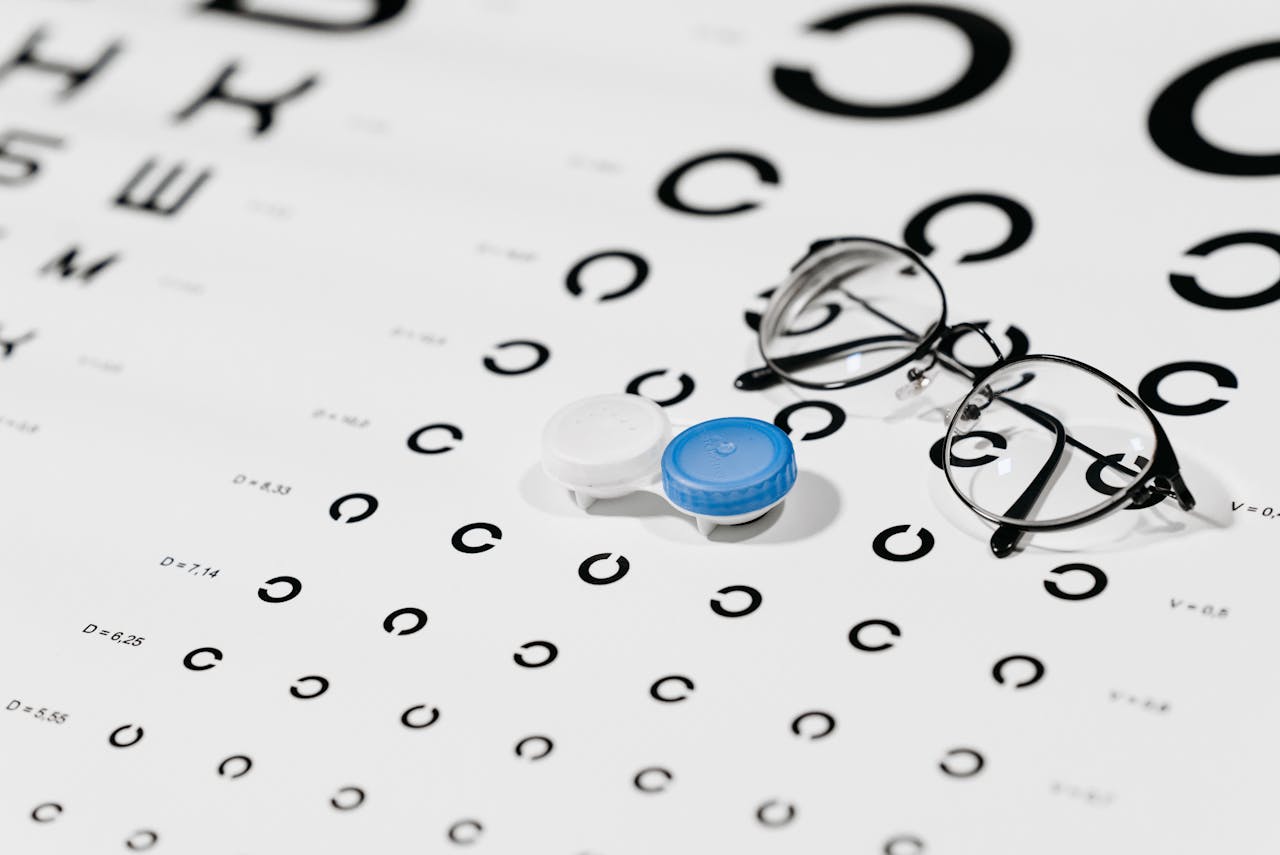
Eye doctor (credit: pexels.com)
Treatment and care for eye twitching, including in the upper right eye, generally depends on the cause and severity. In many cases, eye twitching will resolve on its own without requiring specific treatment. However, there are several steps that can be taken to alleviate symptoms and prevent recurring twitches:
- Get enough rest - Ensuring adequate and quality sleep can help reduce eye fatigue and prevent twitching.
- Reduce stress - Relaxation techniques such as meditation, yoga, or deep breathing can help reduce stress that may trigger twitching.
- Limit caffeine intake - Reducing consumption of coffee, tea, or other caffeinated beverages can help alleviate twitching.
- Use compresses - Warm or cold compresses on the twitching eye can help relieve muscle tension.
- Use eye drops - If twitching is caused by dry eyes, using artificial tears can help moisturize the eyes.
- Improve nutrition - Ensuring adequate nutrient intake, especially magnesium and B vitamins, can help nerve and muscle function.
- Reduce screen time - Limiting the use of computers, smartphones, or other electronic devices can reduce eye fatigue.
- Regular eye check-ups - Ensuring that eyeglass or contact lens prescriptions are up to date can prevent excessive eye strain.
In more serious or persistent cases, a doctor may recommend further treatment:
- Botulinum toxin injections (Botox) - For severe or chronic twitching cases, Botox injections can help relieve muscle contractions.
- Medications - In some cases, a doctor may prescribe certain medications to address underlying causes, such as medication for dry eyes or neurological disorders.
- Physical therapy - Specific exercises for the eye and facial muscles may be recommended in some cases.
It is important to consult a doctor if eye twitching persists for a long time, occurs frequently, or disrupts daily activities. A doctor can determine the underlying cause and recommend the most appropriate treatment.
8. How to Prevent Eye Twitching
Although it is not always possible to completely prevent eye twitches, there are several steps that can be taken to reduce the likelihood of their occurrence, especially in the upper right eye. Here are some ways to prevent or reduce the frequency of eye twitches:
- Maintain a regular sleep pattern - Make sure to get enough quality sleep each night. Good sleep helps reduce eye fatigue and stress.
- Manage stress - Practice stress management techniques such as meditation, yoga, or light exercise regularly. Controlled stress can reduce tension in the eye and facial muscles.
- Limit caffeine intake - Reduce your consumption of coffee, tea, and other caffeinated beverages, especially before bedtime. Caffeine can stimulate the nervous system and trigger twitches.
- Stay hydrated - Drink enough water throughout the day to prevent dehydration, which can lead to dry eyes and potentially trigger twitches.
- Apply the 20-20-20 rule - When working in front of a screen, every 20 minutes, look at an object 20 feet away for 20 seconds. This helps reduce eye fatigue.
- Use anti-glare glasses - If you spend a lot of time in front of a computer, consider using glasses with anti-glare lenses to reduce eye strain.
- Pay attention to lighting - Ensure that the lighting in your workplace or study area is adequate. Poor lighting can cause eye strain.
- Do eye stretches - Periodically, perform simple eye exercises such as rolling your eyes or focusing on objects near and far alternately.
- Maintain a balanced diet - Consume foods rich in magnesium, B vitamins, and antioxidants that are good for eye health and the nervous system.
- Avoid eye irritants - If you have allergies or sensitive eyes, avoid exposure to allergens or irritants that can trigger twitches.
- Have regular eye check-ups - Get regular eye exams to ensure there are no undetected vision problems that may cause eye strain.
By applying these preventive measures, you can reduce the risk of eye twitches and maintain overall eye health. However, if the twitching continues to occur persistently despite applying these preventive measures, it is advisable to consult an eye doctor for further evaluation.
9. Myths and Facts About Eye Twitching
Eye twitching, including in the upper right eye, is often surrounded by various myths and popular beliefs. It is important to distinguish between myths and scientific facts. Here are some common myths and the actual facts about eye twitching:
Myths:
- Eye twitching always means something - Many people believe that eye twitching always has a specific meaning or omen.
- Right eye twitching means good luck - Popular belief often associates right eye twitching with incoming luck.
- Eye twitching can be cured with certain rituals - Some traditions suggest rituals or mantras to stop the twitching.
- Eye twitching is a sign of meeting a soulmate - This myth often circulates in society.
- Eye twitching is caused by a curse - Some mystical beliefs associate twitching with supernatural occurrences.
Facts:
- Eye twitching is generally harmless - In the majority of cases, eye twitching is a normal phenomenon and does not indicate serious health problems.
- Eye twitching has physiological causes - Fatigue, stress, caffeine, and nutritional deficiencies are some common causes of eye twitching.
- Twitching usually goes away on its own - Most eye twitches will stop on their own without the need for specific treatment.
- Persistent twitching can be a symptom of a medical condition - In rare cases, prolonged twitching may indicate neurological issues.
- Lifestyle changes can help - Reducing stress, getting enough sleep, and limiting caffeine are often effective in reducing the frequency of twitching.
- Twitching is not always related to the eye - Sometimes, what feels like eye twitching is actually a contraction of the muscles around the eye.
It is important to understand that while myths and traditional beliefs have their own cultural value, a medical and scientific approach is still necessary to understand and address health issues, including eye twitching. If you have concerns about the eye twitching you are experiencing, it is always better to consult a health professional rather than relying on non-medical interpretations.
10. When to Consult a Doctor
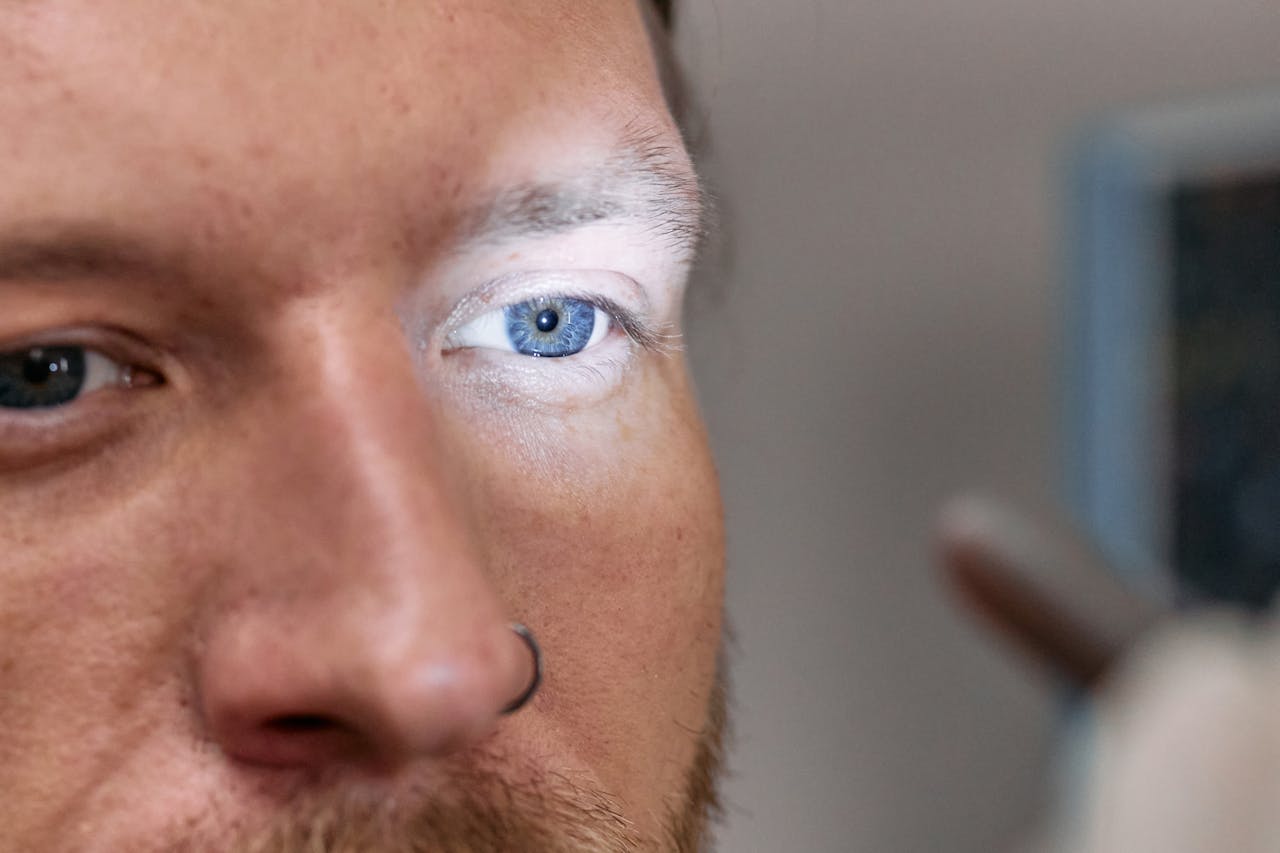
Eye doctor (credit: pexels.com)
Although eye twitching, including in the upper right eye, is generally harmless and often resolves on its own, there are some situations where consulting a doctor becomes important. Here are some conditions that indicate the need for a medical examination:
- Twitching lasts a long time - If the twitching continues for several weeks or more, this could be a sign of a more serious problem.
- Twitching accompanied by a drooping eyelid - If the twitching is accompanied by a drooping eyelid (ptosis), this could indicate a nerve problem.
- Twitching spreads to other parts of the face - If the twitching begins to involve other areas of the face, such as the cheek or chin, this may signal certain neurological conditions.
- Twitching accompanied by changes in vision - If you experience changes in vision along with twitching, consult an eye doctor immediately.
- Twitching causes the eye to close completely - If the twitching is so severe that it causes the eye to close completely, this could be a sign of blepharospasm that requires medical attention.
- Twitching accompanied by pain or discomfort - If the twitching is accompanied by significant pain or discomfort, this could indicate a more serious problem.
- Twitching interferes with daily activities - If the twitching begins to interfere with your ability to perform normal activities, such as reading or driving, consult a doctor.
- Twitching accompanied by other neurological symptoms - If you experience other symptoms such as severe headaches, dizziness, or difficulty speaking along with twitching, seek medical help immediately.
- History of certain diseases - If you have a history of certain diseases such as multiple sclerosis or Parkinson's disease, persistent eye twitching should be evaluated by a doctor.
- Personal concerns - If eye twitching causes significant anxiety or concern, it is worthwhile to consult a doctor for reassurance.
When consulting, the doctor will conduct a thorough examination to determine the cause of the twitching and provide appropriate treatment. This may include eye examinations, neurological tests, or in some cases, further investigations such as MRI or CT scan.
Remember that most cases of eye twitching are benign and can be managed with simple lifestyle changes. However, if you feel worried or the twitching disrupts your quality of life, do not hesitate to seek professional medical help.
11. FAQ About Eye Twitching
Here are some frequently asked questions about eye twitching, particularly in the upper right eye, along with their answers:
-
Q: Is eye twitching dangerous?
A: In most cases, eye twitching is not dangerous and will go away on its own. However, if the twitching lasts for a long time or is accompanied by other symptoms, it is advisable to consult a doctor.
-
Q: How long does eye twitching usually last?
A: Eye twitching typically lasts from a few minutes to several days. If the twitching continues for more than a few weeks, it is best to see a doctor.
-
Q: Can stress cause eye twitching?
A: Yes, stress is one of the common causes of eye twitching. Managing stress can help reduce the frequency of twitching.
-
Q: Can a deficiency in certain nutrients cause eye twitching?
A: Yes, deficiencies in nutrients such as magnesium or vitamin B complex can contribute to the occurrence of eye twitching.
-
Q: Can eye twitching be a sign of a serious illness?
A: In rare cases, persistent eye twitching can be a symptom of certain neurological conditions. However, this is not common.
-
Q: How can I stop eye twitching?
A: Some ways to stop eye twitching include getting enough rest, reducing caffeine intake, managing stress, and ensuring good hydration.
-
Q: Can excessive use of digital screens cause eye twitching?
A: Yes, excessive use of digital screens can lead to eye strain, which can trigger twitching.
-
Q: Is there a medication to treat eye twitching?
A: For most cases of mild eye twitching, medications are not necessary. However, in more serious cases, a doctor may prescribe specific medications or even Botox injections.
-
Q: Can eye twitching affect vision?
A: Mild eye twitching usually does not affect vision. However, if the twitching is very severe or accompanied by other symptoms, there may be temporary vision disturbances.
-
Q: Is there a relationship between eye twitching and age?
A: Eye twitching can occur at any age, but some conditions that cause twitching are more common in older individuals.
12. The Impact of Eye Twitching on Quality of Life
Although eye twitching, including in the upper right eye, is generally a harmless condition, in some cases it can affect a person's quality of life. Here are several ways how eye twitching can impact daily life:
- Concentration Disruption - Persistent twitching can disrupt concentration, especially when performing tasks that require high focus such as reading or working on a computer.
- Anxiety and Stress - For some people, persistent eye twitching can cause anxiety, especially if they worry that it might be a symptom of a more serious condition.
- Sleep Disturbance - If twitching occurs at night, it can disrupt sleep quality, which in turn can affect productivity and mood during the day.
- Appearance Issues - In more severe cases, visible eye twitching can make someone feel uncomfortable in social or professional situations.
- Activity Limitations - Severe twitching can limit a person's ability to engage in certain activities, such as driving or sports that require precise hand-eye coordination.
- Psychological Impact - Prolonged twitching can lead to frustration and even depression in some individuals, especially if they feel there are no effective solutions.
- Communication Disruption - Severe eye twitching can affect facial expressions, which in turn can impact non-verbal communication.
- Work Productivity - For those whose work heavily relies on vision, such as graphic designers or pilots, eye twitching can disrupt professional performance.
It is important to remember that most cases of eye twitching are mild and do not significantly impact quality of life. However, if twitching begins to interfere with daily activities or causes excessive anxiety, it is advisable to consult a doctor. A doctor can help identify the cause and provide appropriate solutions, which may include lifestyle changes, medication, or in rare cases, further medical intervention.
Additionally, managing stress, maintaining a healthy sleep pattern, and paying attention to overall eye health can help reduce the frequency and intensity of eye twitching, thereby minimizing its impact on daily quality of life.
13. The Relationship Between Eye Twitching and Neurological Conditions
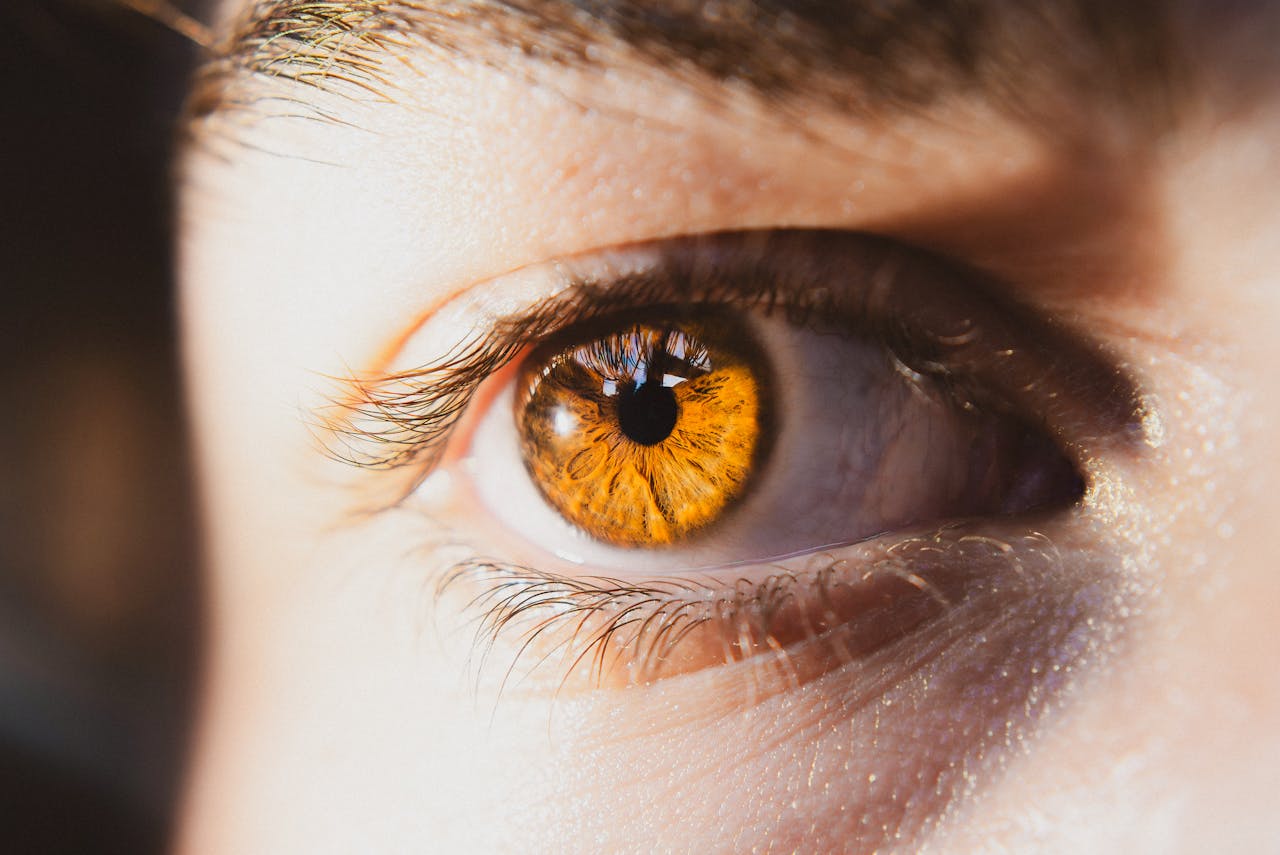
Eye doctor (credit: pexels.com)
Although most cases of eye twitching, including in the upper right eye, are benign and not related to serious health issues, in some cases, persistent or severe eye twitching can be an indication of certain neurological conditions. Here are some neurological conditions that may be associated with eye twitching:
- Blepharospasm - This is a condition where the muscles around the eye experience uncontrollable contractions. Blepharospasm can lead to more severe and prolonged eye twitching.
- Hemifacial Spasm - This condition causes uncontrollable muscle contractions on one side of the face, including the eye area. It is often caused by pressure on the facial nerve.
- Meige Syndrome - This is a neurological disorder that causes uncontrollable muscle contractions in the face, including around the eyes and mouth.
- Parkinson's Disease - Although rare, eye twitching can sometimes be an early symptom of Parkinson's disease, especially if accompanied by tremors or muscle rigidity.
- Multiple Sclerosis (MS) - In some cases, eye twitching can be one of the symptoms of MS, although this is not a common or specific symptom for this condition.
- Tourette Syndrome - Although better known for its tics, some people with Tourette syndrome may also experience eye twitching.
- Dystonia - This is a condition that causes uncontrollable muscle contractions in various parts of the body, including the eye area.
It is important to note that the relationship between eye twitching and these neurological conditions is relatively rare. Most cases of eye twitching are caused by factors such as fatigue, stress, or eye irritation, and are not related to serious neurological problems.
However, if eye twitching persists for a long time (more than a few weeks), worsens, or is accompanied by other symptoms such as muscle weakness, changes in vision, or coordination issues, it is highly recommended to consult a doctor. In such cases, the doctor may conduct further neurological examinations, which may include:
- Comprehensive physical and neurological examination
- Blood tests to check for electrolyte imbalances or nutritional deficiencies
- Electromyography (EMG) to measure muscle electrical activity
- Brain imaging such as MRI or CT scan to check for structural abnormalities
A proper diagnosis is crucial for determining the appropriate management. In cases where eye twitching is related to a neurological condition, treatment may involve a combination of medications, physical therapy, or in some cases, surgical procedures.
While the connection between eye twitching and neurological conditions can be concerning, it is important to remember that the majority of eye twitching cases are not related to serious issues. However, understanding this possibility can help individuals be more vigilant and seek medical assistance when necessary, ensuring that any potential issues can be identified and addressed in a timely manner.
14. The Influence of Environmental Factors on Eye Twitching
Environmental factors play an important role in the occurrence of eye twitching, including in the upper right eye. Understanding how the environment can affect our eye health can help in the prevention and management of eye twitching. Here are some environmental factors that may contribute to the occurrence of eye twitching:
- Lighting - Inadequate or overly bright lighting can cause eye strain, which in turn can trigger twitching. Working in poor lighting conditions or being exposed to very bright light for extended periods can increase the risk of eye twitching.
- Air Pollution - Exposure to air pollution, dust, or other irritants can cause eye irritation. Irritated eyes are more susceptible to twitching.
- Humidity - Environments with low humidity can lead to dry eyes, which is a risk factor for eye twitching. Excessive use of air conditioning or heating can reduce air humidity and affect eye health.
- Digital Screen Exposure - Using digital devices such as computers, smartphones, or tablets for long periods can lead to digital eye strain. This can increase the risk of eye twitching.
- Environmental Allergens - Allergens such as pollen, pet dander, or dust can cause eye irritation and trigger twitching.
- Extreme Temperatures - Being in environments that are too hot or too cold for extended periods can affect eye health and increase the risk of twitching.
- UV Radiation - Excessive exposure to ultraviolet rays from the sun or other sources can cause eye damage and increase sensitivity, which can contribute to eye twitching.
- Vibration - Working with equipment that produces high vibrations or being in environments with constant vibrations can affect the eye muscles and cause twitching.
To reduce the risk of eye twitching caused by environmental factors, several preventive measures can be taken:
- Ensure adequate lighting when working or reading.
- Use air filters to reduce indoor pollution.
- Use a humidifier if the environment is too dry.
- Apply the 20-20-20 rule when using digital devices: every 20 minutes, look at an object 20 feet away for 20 seconds.
- Wear protective glasses when in dusty environments or exposed to UV rays.
- Keep room temperature comfortable and avoid extreme temperature changes.
- Use artificial tears to maintain eye moisture if in a dry environment.
By understanding and managing these environmental factors, we can reduce the risk of eye twitching and maintain overall eye health. It is important to remember that everyone may have different sensitivities to environmental factors, so it is crucial to pay attention to what triggers eye twitching in yourself and take appropriate steps to avoid or reduce exposure to those factors.
15. The Role of Nutrition in Preventing Eye Twitches
Nutrition plays an important role in maintaining overall eye health, including in preventing eye twitching. Proper nutrient intake can help maintain the function of the muscles and nerves around the eyes, as well as support the health of eye tissues. Here are some key nutrients that can help prevent eye twitching:
- Magnesium - Magnesium is essential for healthy muscle and nerve function. A deficiency in magnesium can lead to muscle twitches, including in the eye area. Sources of magnesium include green vegetables, nuts, seeds, and fish.
- Vitamin B Complex - B vitamins, especially B12, are important for healthy nerve function. A deficiency in B vitamins can lead to eye twitching and other neurological symptoms. Sources of B vitamins include meat, eggs, dairy products, and green vegetables.
- Vitamin E - Vitamin E is an antioxidant that helps protect eye cells from damage. Sources of vitamin E include nuts, seeds, and vegetable oils.
- Omega-3 Fatty Acids - Omega-3 fatty acids are essential for eye health and can help reduce inflammation. Sources of omega-3 include fatty fish, flaxseeds, and walnuts.
- Potassium - Potassium is important for healthy muscle and nerve function. A deficiency in potassium can lead to muscle twitching. Sources of potassium include bananas, potatoes, and legumes.
- Vitamin A - Vitamin A is essential for retinal health and can help prevent dry eyes, which can contribute to eye twitching. Sources of vitamin A include carrots, sweet potatoes, and green vegetables.
- Vitamin C - Vitamin C is an antioxidant that helps protect the eyes from oxidative damage. Sources of vitamin C include oranges, strawberries, and bell peppers.
- Zinc - Zinc is important for retinal health and can help prevent macular degeneration. Sources of zinc include red meat, poultry, and legumes.
To ensure a balanced intake of nutrients for eye health, consider including the following foods in your diet:
- Fatty fish such as salmon, tuna, and sardines
- Green vegetables like spinach, kale, and broccoli
- Nuts and seeds
- Brightly colored fruits like oranges, blueberries, and strawberries
- Eggs
- Lean meats
- Low-fat dairy products
In addition to proper nutrition, it is also important to maintain good hydration. Dehydration can cause dry eyes and increase the risk of eye twitching. Make sure to drink enough water throughout the day.
Although proper nutrition can help prevent eye twitching, it is important to remember that eye twitching can also be caused by other factors such as stress, fatigue, or certain medical conditions. If eye twitching is persistent or bothersome, it is always advisable to consult an eye doctor or other healthcare professional.
By paying attention to your nutritional intake and maintaining a balanced diet, you can not only help prevent eye twitching but also support the overall health of your eyes and body. A combination of a healthy diet, good lifestyle, and proper eye care can help minimize the risk of eye twitching and other eye health issues.
16. Conclusion
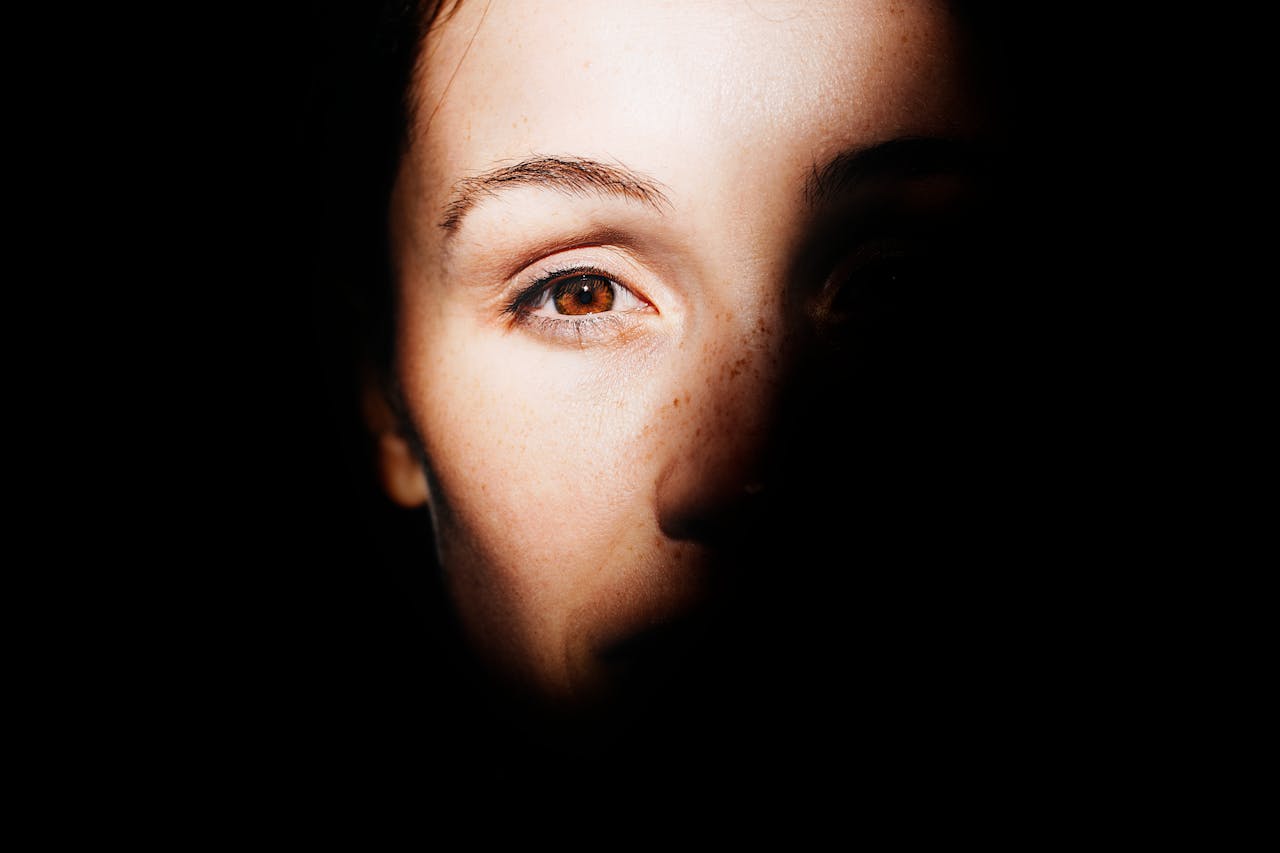
eye (credit: pexels.com)
The twitching of the upper right eye, although often regarded as a sign in traditional beliefs, is actually a common phenomenon and usually not harmful. From a medical perspective, this twitching is generally caused by factors such as fatigue, stress, or nutritional imbalances. While Javanese primbon provides various interpretations, it is important to understand that this is part of cultural heritage and lacks scientific basis.
In most cases, eye twitches will resolve on their own without requiring special treatment. However, if the twitching persists for a long time or is accompanied by other disturbing symptoms, consulting a healthcare professional is a wise step. Prevention and management of eye twitches can be achieved through a healthy lifestyle, good stress management, and attention to overall eye health.
It is important to maintain a balance between traditional beliefs and modern medical understanding. While we can appreciate the local wisdom contained in primbon, we also need to rely on scientific knowledge to understand and address health issues. With this balanced approach, we can maintain eye health and overall quality of life.
(kpl/dhm)
Disclaimer: This translation from Bahasa Indonesia to English has been generated by Artificial Intelligence.








